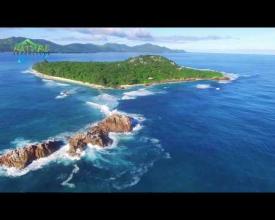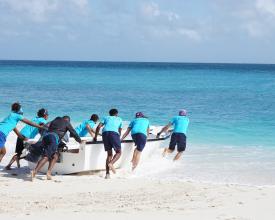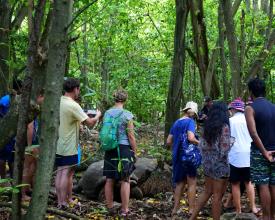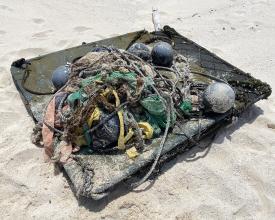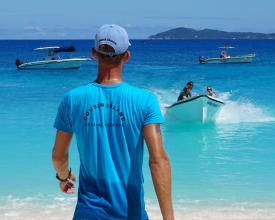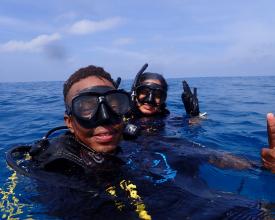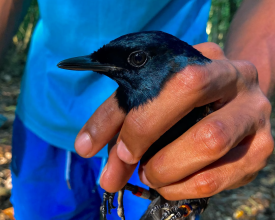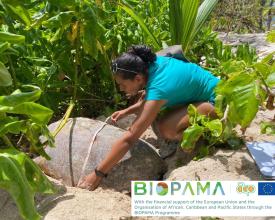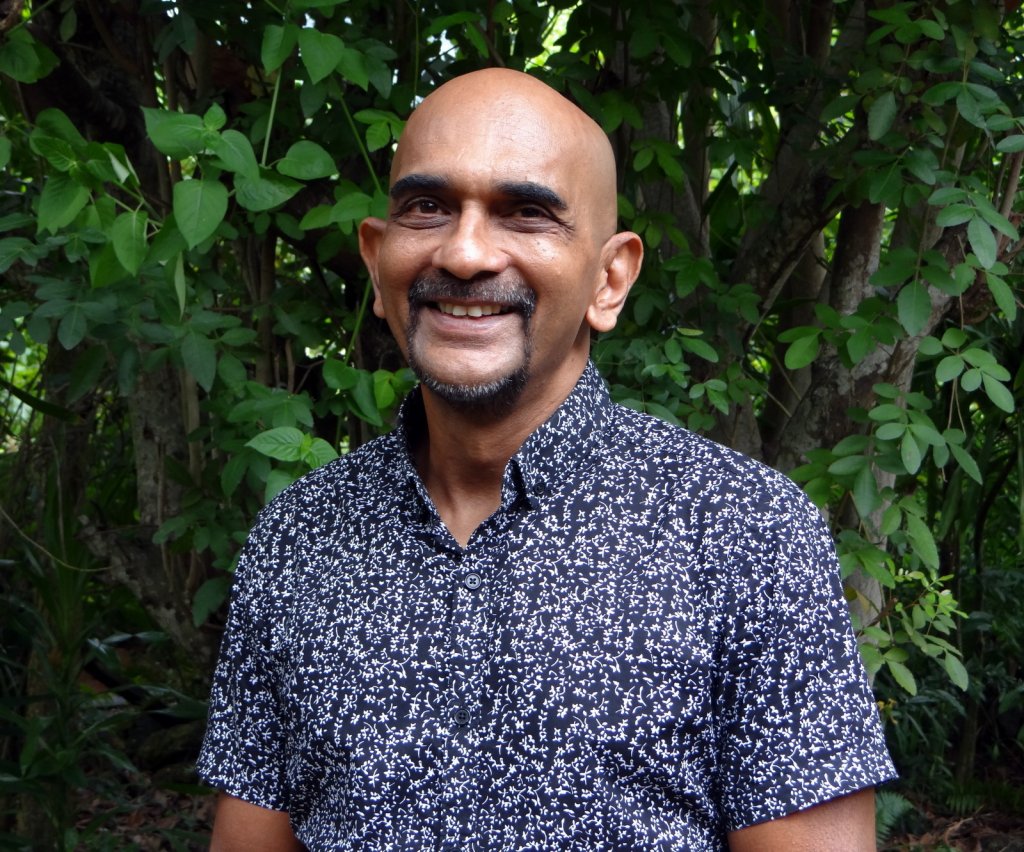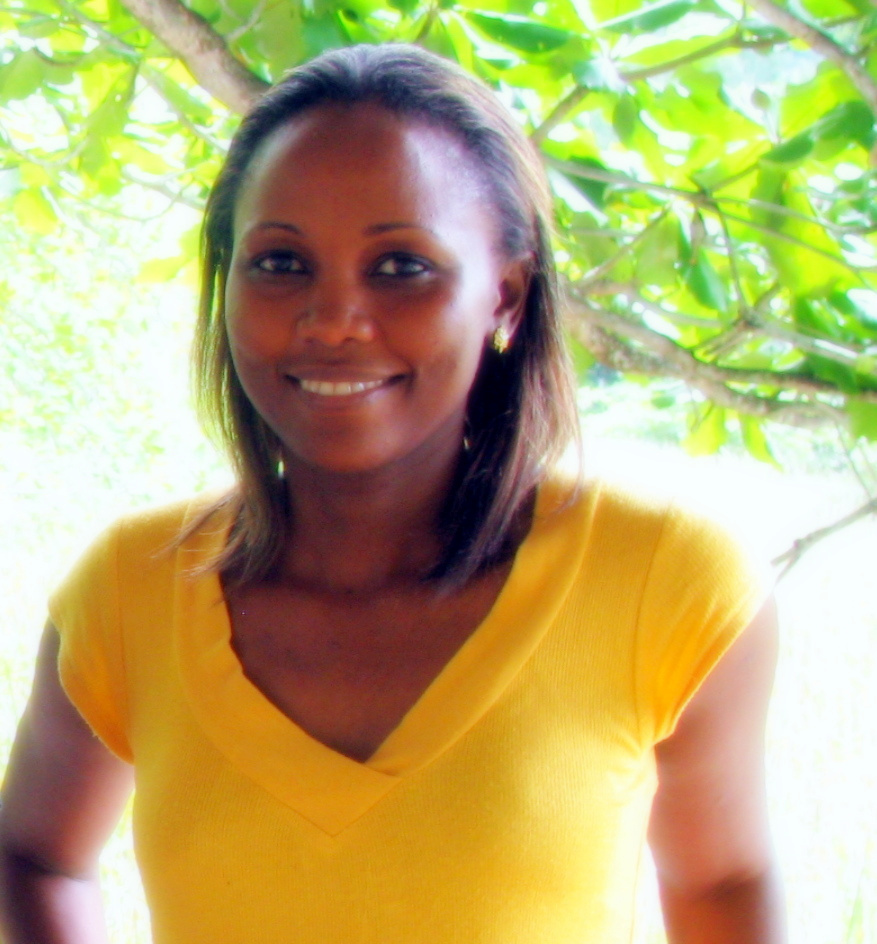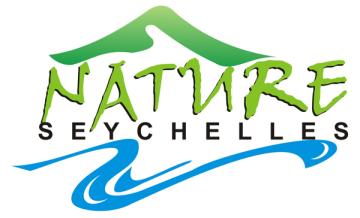
A lifebelt for Cousin Island Special Reserve MPA
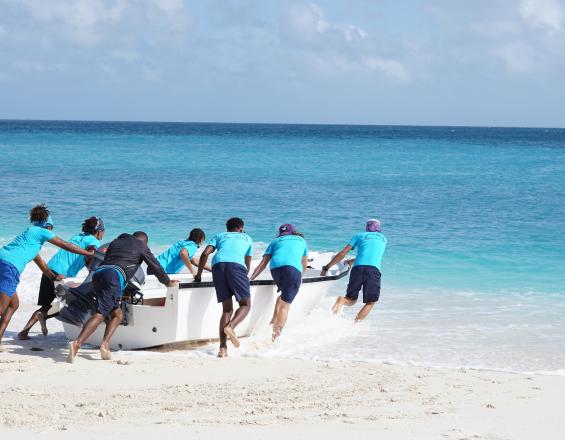
Cousin Island Special Reserve in Seychelles has been financed sustainably through ecotourism for over 50 years. A Tourist User Fee (TUF) funds conservation activities for a range of species, including endangered land birds, seabirds, and Hawksbill turtles, as well as surveillance and infrastructure maintenance. The Covid-19 pandemic wiped out eco-tourism revenue causing funding shortages. A BIOPAMA Rapid Response Grant bridged this shortfall, primarily funding the salaries of 8 wardens and 1 science officer who manned the island and carried out conservation, research, surveillance and maintenance. Cousin Island Special Reserve was able to retain staff and effectively carry out conservation and maintenance activities.
Context
Challenges addressed
The solution sought to overcome the financing challenge for operations on Cousin Island Special Reserve during the Covid-19 Pandemic. The lack of finances put the Reserve and MPA at risk of failing. In an alternative scenario, without staff being on-site 24/7, endangered species such as Seychelles Magpie Robins and Hawksbill turtles, both of which are heavily managed, would not be monitored; other key conservation activities such as monitoring and censuses for seabirds, tortoises and Lizards, beach profile monitoring and clean-ups and invasive species removal would have stopped; there would be no surveillance to manage poaching (of seabirds and turtles) and illegal fishing in the MPA; and infrastructure would not be maintained. The long-term Seychelles Warbler research requires a core staff to be on-site to host researchers, as does the training of students from post-secondary institutions on work-based attachment.
Location
Process
Summary of the process
MPA management requires considerable human and financial resources. Having a core staff willing to continue working remotely despite the Covid-19 pandemic challenges was crucial to keeping the MPA afloat. This was made possible by donor funding that could support salaries. Additional manpower that was provided by students on work-based attachment helped to complete the extensive conservation, surveillance and maintenance work and to fill the gap left by the defunct paying volunteer program. Cousin Island could only open to Ecotourism during the Covid-19 period once it was certified “safe” for travel, therefore meeting all government requirements were paramount.
Building Blocks
PA Effectively manned - "The last band on the titanic"
The effective management of the Reserve depended on the willingness of core staff - 8 wardens and 1 science officer - to remain on the nature reserve despite the countrywide lockdown and restrictions. This staff chose to stay on the island to carry out MPA activities instead of being at home with their families. For context, Cousin Island is relatively remote. Staff live on the island without partners or families, and have the opportunity to get off the island over the weekend. However, during the Covid-19 lockdowns, their limited movement was further curtailed by restrictions.
Enabling factors
- Available donor funding to retain core staff
- Committed staff
Lesson learned
- A committed team that goes beyond the call of duty is required to run an MPA. However, they must also be remunerated for their work
- Management effectiveness can plummet depending on capacities to cope with extended periods of financial difficulties
- We need to continue to safeguard strategic natural assets and the essential services they provide so that resilience is maintained to help us bounce back from crises
Resources
Availability of donor funding for salaries
Staff retention was made possible through the availability of the Rapid Response Grant to fund salaries. Cousin Island has been self-sustaining for many years before the pandemic. The donor funding helped to rectify the shortfall in financing experienced by the reserve due to the collapse of the tourism industry in Seychelles
Enabling factors
- A donor willing to fund salaries
- Dedicated staff
Lesson learned
- The traditional sources of funding and other kinds of support dried out during Covid-19. This crisis was a red alert for the conservation of biodiversity. Conservationists must look for innovative kinds of support, learn many new things and do more with less, particularly by using disruptive technologies such as AI and drones or monetising virtual tourism experiences
- We need to look for avenues for unrestricted income for recurrent conservation budgets outside of tourism. Notably in 2021, we worked with IUCN and Porini Foundation to launch the Seychelles Magpie Robin as the first nature collectible, an NFT for conservation to raise funds to conserve the species
Resources
Partnerships for conservation
Additional manpower was provided by students from two institutions - the Seychelles Maritime and Seychelles Tourism Academies - on work-based attachments. A total of 10 students came to the island. They were extremely useful, taking the place of paying volunteers from the Conservation Boot Camp, which also collapsed in the wake of Covid-19 restrictions for travel. One of the students was eventually employed. Another budding partnership was formed with the Seychelles Coast Guard to whom the staff reported illegal fishing boats. And finally, once the government allowed for a resumption of ecotourism, partnering tour operators began to bring visitors back to Cousin Island.
Enabling factors
- Nature Seychelles’ training program already in place known as the “EnvironMentor” and a long-term relationship with the placing schools. Most of the staff on the island have come from these institutions
- A long-term relationship with tour operators who have been bringing visitors to the island for decades
Lesson learned
Trust built with tour operators over the years played an important role in the resumption of ecotourism, but new tour practitioners (small scale) have begun to come to the island probably as a result of diversifying incomes during and after the pandemic.
Compliance with health and tourism safety requirements for reopening
After staying afloat and fulfilling government health requirements, the island was reopened earlier than expected to ecotourism. Staff were trained by health officials on maintaining safety during visits, and signage directing visitors to observe hygiene and other protocols put up. The entire team on the island was vaccinated. As part of a digitization process, Nature Seychelles provided an online payment option for ease of ticketing. Tour operators were contacted and apprised of the health authority's requirements before the reopening.
Enabling factors
- Staff were vaccinated and taken through new health protocols for visitors
- Nature Seychelles/Cousin Island management worked hard to successfully complete all requirements and to get certified as safe.
- An online payment system was put in place to supplement physical transactions
Lesson learned
- Adaptive management to quickly find ways in which to operate during times of crisis was required
- A proactive management that worked outside the conservation box and worked with all authorities to ensure species conservation was given priority
Impacts
As a result,
- Core island staff were retained;
- Critical conservation activities continued particularly monitoring of endangered land birds, critically endangered Hawksbill turtles, breeding seabirds, invasive species removal, censuses for tortoises and lizards; beach clean-ups and profiling; 2 reports were produced and data collected aggregated for further reports
- Daily patrols both on land and in the sea, one illegal fishing trap and a Fish Aggregating Device removed from the MPA; a budding relationship with the Seychelles Coast Guard and an official procedure for reporting illegal fishing boats established;
- 10 students from the Seychelles Maritime and Tourism Academies had their work-based training and provided additional help; one hired as a warden
- The long-term and globally significant research on Seychelles warbler with overseas universities continued.
- Cousin Island reopened to tourists earlier than expected as staff were on site to provide eco-tourism-oriented guided tours of the island, and revenues began to trickle in
- Maintenance of trails, water reservoirs, the solar energy system, boats & engines as well as the buildings (staff and researcher accommodation as well as a small lab).
Beneficiaries
- Staff who retained their salaries and the NGO which kept its core staff
- Students on work-based attachment and researchers
- Nature Seychelles from receiving revenue
- Tour operators benefiting from ecotourism.
- Seychelles’ conservation and tourism
Sustainable Development Goals
Story
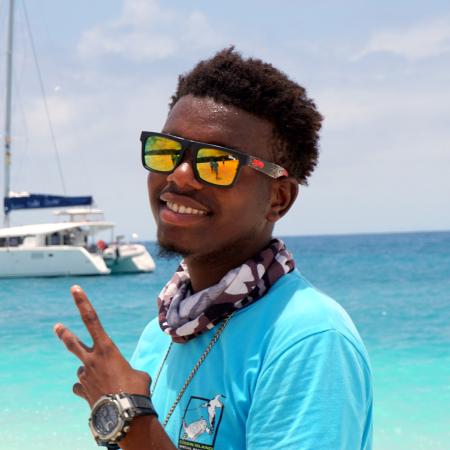
You are most likely to meet Christopher Rose on your visit to Cousin Island. Christopher, referred to as "Carrot" by his fellow wardens, conducts guided tours of the island, showcasing the unique biodiversity of the Seychelles to his visitors. With a typical island lilt, he regales visitors with stories: how shearwaters sound like ghosts at dusk, how the Seychelles Magpie Robins follow you around when you whistle, and how George, the oldest Aldabra giant tortoise on the island, is a ladies’ man.
Christopher's confidence is immediately apparent.
“Like all our Wardens, he is proficient at small boat handling, conservation practices including monitoring species and invasive species control, surveillance, visitor management and guiding, small repairs and maintenance, and soft skills like dealing with stakeholders. The wardens of Cousin Island are probably some of the most multidisciplinary protected area staff in the world,” says Dr Nirmal Shah, Nature Seychelles’ Chief Executive.
It may surprise you to learn that Carrot is a newbie on Cousin. Just two short years ago, he was a fresh student at the Seychelles Tourism Academy taking his first tentative steps towards a career as a conservation warden. He is one of ten students who did their work-based attachment on the island in 2021. Their training was made possible by the BIOPAMA grant support.
He was recruited after he completed his work experience on Cousin after he displayed exemplary behaviour and ability.
At the time of his attachment, Christopher’s favourite activity was turtle patrols. He enjoyed seeing turtles coming to lay their eggs and hatchlings making their way to the ocean.
Today he is proficient at turtle monitoring and is often tasked with being the turtle team leader, helping volunteers learn the ropes of monitoring.
But talking to visitors is what he enjoys the most.
Ecotourism is the core funding mechanism for the conservation of Cousin. Its success has come through deliberate efforts to provide an excellent product and its operations are aligned to international standards.
"Our challenge is to maintain the integrity of the island as a cradle of biodiversity and popular ecotourism site," Dr Nirmal Shah concludes. “This financial support during the Covid-19 crisis helped us do that.”

